- Home
- Christine Morgan
The Raven's Table: Viking Stories Page 2
The Raven's Table: Viking Stories Read online
Page 2
She retreated to his side and sat there, huddled in her sealskin cloak. The candle burned low and went out. When hunger and thirst again bestirred her, she rose to take a few bites, a few drinks of mead. Sometimes she would bring out her knife again, and set its point to the swell of her breast, but each time—to her shame—her courage would slip from her.
Now and then she lit another candle, but the sight of the treasures did not gladden her spirits, and the sight of the dead as their flesh continued to darken and decay only brought her to despair.
Even in the darkness, though, the dead would make sounds. Tendons creaked as rigor stiffened and relaxed their limbs. Gases gurgled within their bloated bellies. Once, a rancid and rattling corpse-belch produced such a stench that, inured though she was to the odors of the mound, Hildirid was made to vomit up her meager meal.
At last she became aware of new noises. She heard a scratching, like that of rats… faint at first, but gradually growing louder. Next came a harsh grating and scraping, as of metal on stony soil.
And Hildirid understood.
Word of the wealth of Sveinthor’s death-hoard must have spread far and wide, the value increasing all the more in the telling, until at last it had won the interest and greed of the lowest kind of dishonorable men. Grave-robbers, armed with shovels, come to plunder from the dead. To steal away the gold and silver, the amber and ivory, the cups and platters and other treasures. They would strip the corpses bare of their mail-coats and arm-rings. They would have Wolf’s Tooth from Sveinthor’s cold grasp, if they had to break off the brittle, rotting husks of his fingers to do so.
In silence and utter darkness, for she by now knew her way as well as she’d ever known her own house, Hildirid took up her knife and went to wait by the entrance. She could hear the digging-sounds louder now, and the voices of the men. As they dug, and cleared away more of the earth, their words came readily to her ears.
Hildirid was left aghast at all that she heard.
Kjartan’s enemies had returned in greater number than before, aided by treachery as some of the king’s own men turned against him. The mighty fort had fallen. Hundreds of men had been slain, their weapons and valuables taken and their bodies left unburied.
Now Kjartan’s feasting-hall rang and thundered with the revelry of his foes. They gorged on food from his store-houses and drank his mead by the barrel. They butchered his goats and pigs, forced the surviving men to fight like bears or horses for their amusement, and made slaves of the women and children.
Worst of all, Kjartan himself had been seized prisoner. Night after night, he was made by his captors to appear in one humiliating costume after another. Fool’s garb, a monk’s robe, the clothes of a woman… these things, they dressed him in, and led him before the men, who laughed and called and hurled refuse at the white-bearded king.
Such mistreatment of the man who had been kindly as a father to Sveinthor filled Hildirid with anger and hate.
Then she heard clearly a voice that she knew.
“If she is dead, old woman, I’ll hang you by your heels from a tree-branch and leave your body to be picked by the ravens.”
The voice belonged to Ulfgrim the Squint, and it was answered by the cracked and peevish tones of Kjartan’s wise-woman, who had prepared the poisons.
“I did as you wished, noble lord,” she said. “I mixed in her cup a potion of deep-sleeping, but I told you that you would have to be quick in fetching her out of the tomb before its effects wore off and she woke. I told you that! If she has starved, or died of the cold, it is no fault of mine!”
“Peace, brother,” another voice said, and Hildirid knew this one as well. It was Halfgrim the Thief, bastard half-brother to Ulfgrim. “If she is dead, she is dead. There are other women and fairer we can find for you. Wealthy as you are now, you can have your choice of them, and never mind that you are ugly as the rump-end of a troll.”
Rough snorts and laughter greeted this, though not enough to keep her from hearing Ulfgrim’s next words. “I will have Hildirid,” he said. “Or I will have none other.”
The deadly determination in his voice made the laughter stop for all but Halfgrim, who chuckled all the more. “Then I hope for your sake the maid lives, or she’ll be a bedmate even stiffer and colder than the ones you’re used to. Myself, it’s Sveinthor’s gold that I want.”
“And I,” said another voice, one that Hildirid did not know, “want only to piss on his rotting bones for what he did to my father.”
“As a favor to me, then, Runolf,” Halfgrim said, “be patient and save your pissing until I’ve gotten off his mail-coat. It should fetch a pretty price in silver, for all it has that hole ripped across the guts.”
Runolf, she knew, must be Runolf the Younger, whose father’s skull Sveinthor had crushed with his shield-boss in the battle. So Ulfgrim had joined with the traitors, and Ulfgrim had seen to it that the poison in her cup had not been poison at all.
“Yes, yes,” Ulfgrim said, aggrieved. “And the blame for that hole, we all know, you lay on my head.”
“I do, indeed, brother,” Halfgrim said. “You were supposed to slash his hamstrings and then skewer him through the neck. What made you stab him in the belly?”
The very breath in Hildirid’s lungs had turned to frost, and the blood in her veins to water as icy as that of the far northern seas.
“I had no choice,” came Ulfgrim’s reply. “He realized my intent at the moment before I would have struck, and had I not sunk my blade into his guts, he would have had off my head.”
There was more talk as the digging continued, but Hildirid paid it barely any mind. At last the shovels met wood, and were laid aside, and she then heard the splintering crash of axes against the planks. They broke inward. Torchlight poured through the gaps, bright as the brightest sun’s rays to her, long accustomed as she was to blackness and feeble candle’s flame.
The first man to step through was not Ulfgrim but his half-brother, his gaze fixed greedily on the glitter of gold and the sparkle of silver. Halfgrim never once looked her way until her knife-blade plunged down. He wore no mail, and she embedded the steel to the very hilt in his chest.
Halfgrim screamed like a woman in childbearing and staggered back, then fell sprawled at Ulfgrim’s feet. The knife had been yanked from her grip and now Hildirid faced them weaponless, but the sight of her revealed by the torches held the men shocked and motionless with terror. A hag she must have been, a filthy crone with dirt on her clothes and her hair hanging in strings and clumps, her eyes as wild as those of a raving berserk.
Then some fled, casting aside their torches and tools into the crude trench of earth they had made to reach the barrow-mound.
“You see?” said the wise-woman. “She lives, as I told you.”
Ulfgrim stared at Hildirid, and spoke her name in a strengthless voice. He stepped over Halfgrim and offered out his hand.
“Traitor,” she said to him. “Foul, murdering traitor! You killed Sveinthor!”
“I did it for love of you,” Ulfgrim said.
She flung herself at him, though not in the lover’s greeting for which he had hoped. Her nails, long and ragged, raked at his face and dug long furrows in his stubble-bearded cheeks. Ulfgrim grappled with her, his strength far more than a match for hers, and soon held her with her arms bent painfully behind her back.
Runolf the Younger pushed his way past them as Hildirid struggled in Ulfgrim’s grasp. “You men! There is the treasure, the reward you were promised. I will have satisfaction for my father’s death.”
“What of Halfgrim?” another asked.
“Leave him,” Runolf said. “It is a burial-mound, after all.” He turned with torch raised high so that its light was shed over the central barrow.
And there he stopped, for the corpse of Sveinthor was sitting upright.
The wolf’s pelts had fallen away to the earthen floor. His torn mail gaped where the fatal blow had been struck, and through it could be seen the b
ulging maggot-ridden fester of his entrails. His eyes, no longer clear blue but clouded and murky as if rimed with muddy ice, peered around from within the gilded eye-pieces of his helm.
Then Sveinthor rose to his feet.
Some of his guts slipped from him, swinging against his thighs like a grisly apron. His joints groaned and his bones crackled. Bits of his skin had sloughed away, leaving raw muscle glistening. His lips had peeled back from his teeth, giving him a leering death’s rictus of a grin.
The sword Wolf’s Tooth he still held in his hand, and he extended it now in challenge and invitation.
“Draugr!” the wise-woman cried, and threw herself to his knees babbling prayers to Thor and Freya and Christ and to other gods of which Hildirid had never heard tell.
It was a word most used when a man was lost at sea and denied decent burial, so that his restless corpse was doomed to wander. Sveinthor had not drowned, but he was draugr nonetheless.
A fierce joy sang within Hildirid’s breast, and she cried her lover’s name. “Sveinthor!”
“Kill him!” shouted Ulfgrim, retreating and pulling Hildirid as he went.
Runolf had dropped his torch and snatched out his own sword. As the other men rushed forth, waving their axes and shovels, shrieking their horror at this unnatural foe, Runolf hacked down at Sveinthor’s shieldless left arm and severed it at the wrist.
No blood gushed from the stump. There was a trickle of thick blackish ooze, and a fresh whiff of stink. The hand fell to the ground and twitched there, then turned itself over and began finger-clawing toward the oncoming men.
Wolf’s Tooth flashed down, and Runolf the Younger spun away with his face sliced open. From cheekbone to chin it hung down in a flap of bleeding meat, exposing his teeth and gums.
But the others were urged on by desperation and terror, and raced wildly at Sveinthor. One of them trod upon the severed left hand, which skittered up his leg swift as a spider. His charge became a frantic leaping dance as he beat at himself with his shovel, hoping to dislodge the scrambling hand. He was too slow. It vanished beneath the hem of his tunic and crawled to his groin, where it squeezed and mauled and twisted like someone wringing water from a rag. The man squealed.
A hoarse and rumbling howl came from Sveinthor’s throat. Though distorted, it was still familiar. It was his battle-cry, his call to arms.
At the sound of it, one by one around the burial chamber, his loyal men rose in answer. Eyjolf, with an arrow still jutting from his eye socket. Bork, the knob of his shoulder-bone showing through pulped and mangled flesh where his arm had been cut off. Thrain the Merry sprang up almost eagerly. They seized the weapons with which they had been laid to rest, and took their places at Sveinthor’s side.
Their women rose as well. Faithful Unn of the dimpled cheeks… not dimpled now, but sagging, and the foam of the poison dried to a crust on her lips. The slave-girl, a little creature and young, but hissing like a cat. Even Ainslinn, head lolling on her puffed and swollen neck, got slowly to her feet.
And the battle was joined in a furious clangor of metal and screams. The close confines of the burial-chamber became a slaughtering-ground. Flesh struck wetly on the floor and blood flew like sea-spray in all directions. The draugr women had no swords, not even knives, but they had teeth and fingernails and fists, and a strength that seemed more than the equal of any two mortal men.
Ulfgrim had seen enough, and fled, dragging Hildirid with him. In her last glimpse of the scene within the mound, it looked almost to her as though the risen dead were not merely fighting their foes, but devouring them… tearing off mouthfuls of meat, lapping hungrily at the blood-spatter, even nuzzling their faces into the guts of the fallen to come up with steaming livers and intestines clenched in their jaws.
The night outside was foggy and damp, turning the distant torches on the walls of Kjartan’s mighty fortress to golden smears of elf-light. Though she fought him with every step, Hildirid could not win her way free of Ulfgrim’s iron grasp. He pulled her into the broad field, the both of them stumbling over broken spear-shafts and split shields and the scavenger-picked remains of the unburied dead.
“Let me go!” demanded Hildirid, trying to bend back his fingers where they held hard around her wrist.
“They’re monsters, you foolish sow!” Ulfgrim shouted. “Did you not see? They’ll kill you, or eat you alive!”
“I’d rather that death, than life with you!”
But he would not release her, even when she fell full-length and tangled in a pile of corpses. Taking her by a fistful of hair, he made as if to sling her over his shoulder and carry her the rest of the way.
Then a long shaggy shape hurtled out of the swirling fog and slammed into him, ripping his hand loose from Hildirid’s hair and leaving long strands caught in it. He was knocked hard to the wet earth, where a shadow-shape loomed over him.
It was Bryn-Loki, Thrain’s dog, who had never liked Ulfgrim. Parts of his fur had fallen out in patches, and the rest was slimed green with mold. He smelled dank, and horrible. The growl that came from low in his throat was bubbled and strange. His teeth, though, when he skinned his black lips back from his muzzle, looked strong, and sharper than ever.
Ulfgrim rolled into a crouch, drawing his sword. It was, Hildirid suddenly knew, the same one that had struck Sveinthor that treacherous, fatal wound. Now he thrust it into Bryn-Loki’s chest as the dog leaped. The blade sheared through ribs and muscle and gristle, loosing a spurt of foul fluid. Bryn-Loki fell shuddering onto his side. Ulfgrim got up, shaking but sneering victoriously, and wiped the reeking blade on the dog’s thick fur.
Bryn-Loki raised his head, snarled, and clambered to his feet. He shook, the way a dog will after a hard rain, and more fur dropped in mangy clots from his hide. Stiff-legged, he advanced on Ulfgrim, who turned again and ran for his very life as if all the fiends of Niflheim were close upon his heels.
There were no fiends but Bryn-Loki, but Bryn-Loki was fiend enough. Hildirid, kneeling amid the dead, watched the chase as Ulfgrim made for the safety of the earthen wall around the fort. The churning mist had nearly hidden them when she saw Ulfgrim madly scaling the wall, and Bryn-Loki make a final lunging leap. His jaws snapped, tearing a chunk from Ulfgrim’s buttock. Then Ulfgrim was up and over and gone from her sight.
The dog trotted back to her. As Bryn-Loki came, the first stirrings of fear gathered in her belly. She wondered if it would hurt, the rending of his teeth. She wondered if it would be quick.
She closed her eyes as his paws thumped to a halt on the damp earth only a few paces distant. It seemed she could smell Ulfgrim’s blood on his snout. A cold nose bumped her, snuffling thickly. Then a colder tongue, wet and reeking with decay, lapped at her face.
Hildirid opened her eyes. Bryn-Loki sat hunkered on his haunches before her. His head was cocked, his tail moving in jerky, lurching wags as if he could not quite remember how to do it properly. When he saw her looking at him, he uttered a hollow whine, and the wagging became so energetic she worried his tail might fall off.
Other figures appeared through the gloom. They were drenched in blood, and gobbets of flesh clung to their garments and hair. She knew them, and as they neared her, she stood to face them with the dog sitting beside her and her hand resting on top of his head.
Eyjolf’s leg had been hacked to the bone, so that he staggered along nearly lame, leaning on Unn, who swung a tattered scalp of long grey hair—the wise-woman’s hair—from her hand. Bork, already lacking one arm, now carried his own head tucked into the crook of the other, his eyes blazing fiercely. Ainslinn could no longer walk, but pulled herself over the earth by her arms. The little slave-girl who had been buried with Thrain held a man’s forearm, and munched happily at it as she might have gnawed a pork rib. Thrain himself wore looping strings of intestine around his neck, and his grin was wider than ever.
And with them came Sveinthor. His mail was shredded and his body scored with countless cuts that seeped and oozed. He still
held Wolf’s Tooth, a dark red rain falling from the blade. His severed hand rode upon his shoulder like one of Odin’s ravens.
Hildirid went to him, and embraced him, but then stepped back for she knew that his work was not yet finished. He surveyed the battle-field, strewn as it was with the unburied dead, and once more raised his hoarse voice so that it rang and rolled like thunder.
In the fortress on the hill, there was much commotion and alarm. Perhaps when Ulfgrim had come in, they had dismissed his claims as drunken ravings or madness. But now, as one by one the corpses of Kjartan’s slaughtered army laboriously raised themselves and armed themselves with what makeshift weapons they could find, the living men flocked to the walls with many torches and stared out in horror.
Sveinthor strode among them. They formed into ranks and lines below the earthen wall and the approach to the fort. At the front was a shield-wall, the shields splintered and broken as they overlapped. With slow but inexorable, relentless purpose, the walking dead began their advance.
A storm of arrows descended upon them, and though many found their mark and lodged in flesh, they could not do much harm. Some of Sveinthor’s draugr were so bristling with arrow-shafts by the time they reached the base of the wall that they looked like hedge-hogs, and still they advanced.
Hildirid stood atop the burial mound, her hair and sealskin cloak streaming around her in the dire wind that had sprung up. Bryn-Loki sat at her side, and her hand still stroked his head and scratched his ears, for he was whining in disappointment at having been left behind from the battle to guard her.
Now from the fort came flaming arrows, but many of the draugr had lain so long in the rain and mud that they did little more than smolder. One or two, fatter in life, burned like tallow, and became shuffling candles in the shapes of men. The smoke from their singed hair and charred, rotting bodies blew back over the wall, filling the fort with an abominable stench.

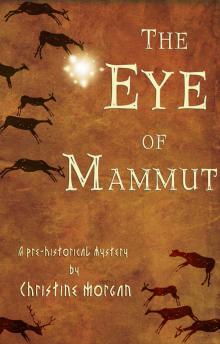 The Eye of Mammut
The Eye of Mammut Megan's Wish
Megan's Wish Endless Miles
Endless Miles For The Best
For The Best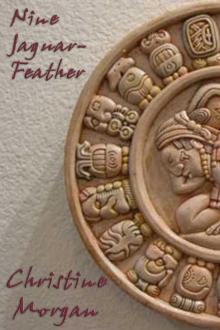 Nine Jaguar-Feather
Nine Jaguar-Feather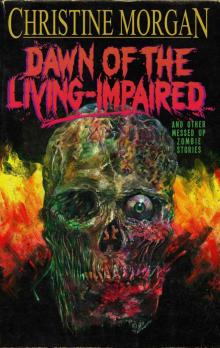 Dawn of the Living-Impaired
Dawn of the Living-Impaired Resonator: New Lovecraftian Tales From Beyond
Resonator: New Lovecraftian Tales From Beyond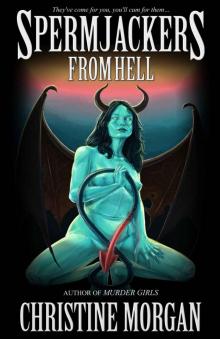 Spermjackers From Hell
Spermjackers From Hell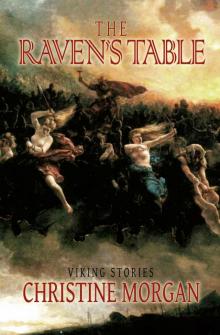 The Raven's Table: Viking Stories
The Raven's Table: Viking Stories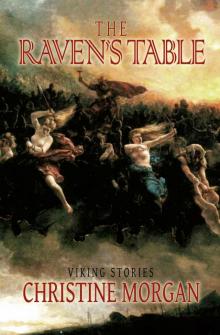 The Raven's Table
The Raven's Table